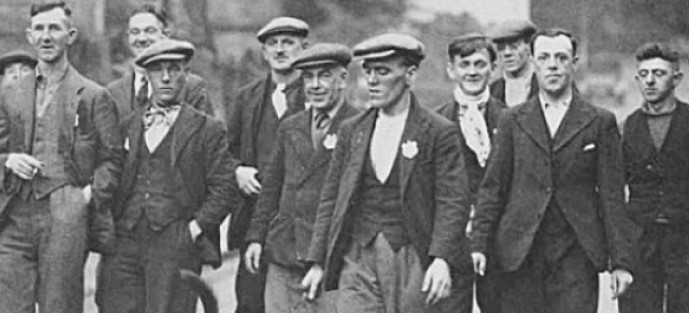New resource guide on reproductive justice helps us examine its past and think critically about its future
This complex issue is better understood when students and researchers have historical context

By Jodi Johnson, Product Marketing Manager
Reproductive justice has gained significant importance in recent years, particularly in the U.S., where it is one of the most contentious issues in public policy. Its complex and dynamic narrative is punctuated by defining legal cases and activism. Primary sources document this complicated history, providing researchers with insights that lead to breakthroughs and enabling students to think critically about the issues and derive their own conclusions.
ProQuest, part of Clarivate, has one of the most expansive collections of documents related to reproductive rights and justice. They are described and highlighted in a new resource guide for research, teaching, and learning, Reproductive Justice: A Resource Guide. The guide brings together important records and voices on reproductive justice and healthcare from multiple primary source collections, including bridging documents from Disability in the Modern World, ProQuest History Vault, and Women and Social Movements in the US, among others. The guide examines the evolution of historical representation of reproductive rights, profiles activists and helps students and researchers envision what the future of reproductive justice may hold.
Viewing history through personal experiences
Among the documents in the guide are reports like the December 1867 Historical Monthly Report of Sick and Wounded Freedmen, which provides a glimpse into the lives of freedmen who were formerly enslaved. The report includes a section on “Conditions and Diseases Peculiar to Females” that lists abortion as one of the health issues affecting women.
The inclusion of abortion in this report highlights the long and complicated history of reproductive healthcare in the U.S. Providing rich insight to complement this report is a handwritten diary entry by a North Carolina physician and enslaver Calvin Jones that documents his treatment of a woman who had an abortion in 1800. These archival primary source documents found in ProQuest History Vault offer a unique window into the experiences of women seeking reproductive healthcare in the past. Putting these documents together enables researchers and students to examine both the legal precedents that have shaped reproductive rights and how they affected people’s lives.
Understanding the scope of key legal cases
Alongside these primary sources, the resource guide explores key legal cases that have impacted reproductive rights. Griswold v. Connecticut, a landmark 1965 Supreme Court case, established the right to privacy as a fundamental principle, which influenced numerous subsequent reproductive rights cases. An audio interview with Estelle Griswold from 1976, found in Women’s Studies Manuscript Collections from the Schlesinger Library, lets students and researchers hear her personal perspective on the case.
The landmark case Roe v. Wade, in which the Supreme Court established a woman's right to choose to have an abortion, was based on the same right to privacy established in Griswold and has been a focal point of the reproductive rights movement ever since. The overturning of this case in 2022 caused historic demonstrations across the U.S. While these are pivotal, the resource guide helps students and researchers examine the broader impact of reproductive rights, which encompass not only cases related to abortion but also include access to contraception, comprehensive sex education and healthcare that is free from discrimination and stigma.
Studying advocates and activists
The reproductive justice movement today has been shaped by activists and advocates on both sides of the issue. Reproductive Justice: Resource Guide examines the work of pivotal figures such as Margaret Sanger, who founded the birth control movement in the early 20th century and advocated for access to contraceptives as a means of empowering women and reducing poverty. However, her views were not universally accepted within the movement. Students and researchers can use the guide to learn more about activists like Mary Ware Dennett, a suffragist and birth control advocate, who held starkly different views from Sanger. Dennett worked to eliminate all legal restrictions against the dissemination of contraceptive information, while Sanger believed that only medical professionals could share this knowledge.
Exploring the spectrum of history
The guide also brings to light the unique challenges faced by marginalized communities. The African American community played a crucial role in shaping the birth control movement by bringing new perspectives and experiences to the table. One pivotal example of this is the establishment of the first birth control clinic in Harlem by the Harlem Branch of the Clinical Research Bureau, founded by Margaret Sanger, James Hubert and members of the Harlem Social Workers Club. This groundbreaking clinic aimed to provide reproductive healthcare to Black individuals who had been neglected by mainstream medical services. Moreover, the clinic aimed to offer employment opportunities for African American healthcare professionals, which was a rare opportunity at the time. However, the clinic's founders made a clear distinction between birth control and abortions, providing only the former.
African American birth control advocates faced numerous challenges, including rampant racism and condescension towards the poor in Harlem, as they worked to provide access to reproductive healthcare. One of the interesting resources the guide presents is the African American Birth Control Advocates project, available in Women and Social Movements in the United States, which sheds light on the perspectives and actions of these advocates, highlighting their struggles against racism coupled with eugenics – the discredited theory that selective breeding could cure social ills. Students and researchers can travel back in time as they explore documents like a clinic flyer from the Harlem Branch, letters between social welfare leaders Morris Waldman and Jacob Billikopf, articles on birth control by Dr. Marie P. Warner and W.E.B. Du Bois, and documents on eugenics authored by Elmer A. Carter, a controversial medical researcher and clinician who played a crucial role in reproductive health and endocrinology.
Envisioning the future
The resource guide provides access to valuable projects that offer expert insights from scholars such as Karissa Haugeberg, Rickie Solinger and Mary Ziegler on how U.S. reproductive rights arrived at their current state and what can be expected going forward. The Schlesinger Library Family Planning Oral History Project collection is another valuable resource that documents the experiences of birth control leaders during the 1970s and contextualizes the nature of the birth control reform struggle between 1915 and1920, and the 1960s.
These resources highlight the importance of understanding the historical context of reproductive healthcare and its impact on shaping public opinion towards it. By examining the past, researchers and students can gain a more comprehensive understanding of the present and future of reproductive justice and healthcare, and how it relates to larger social and political progress. Access to these resources can be particularly valuable for individuals seeking to advance reproductive justice and healthcare, including scholars, policymakers, activists and advocates.
Plumb history via ProQuest Women's & Gender Studies’ extraordinary range of content, including historical and contemporary magazines, archival collections, historical books, photographs and firsthand experiences relayed in letters and diaries. Request your free trial.

Jodi Johnson
Product Marketing Manager for History and Social Change, Social Science and Performing Arts portfolios. With a profound appreciation for history and a background steeped in the arts, she fuses creativity and scholarly insight to offer compelling narratives and to delve into the historical significance behind them.
Recent Blogs
Academic AI’s capabilities are harnessed in ProQuest Research Assistant to create a trusted, powerful research companion
Animal Allies LibList examines animals’ significance in our lives
Tapping a book’s network of citations helps librarians identify key influencers in a sea of titles







